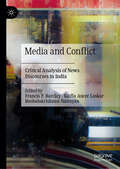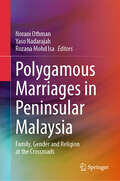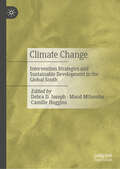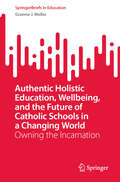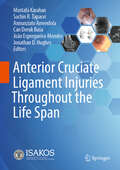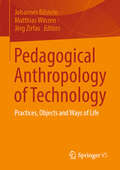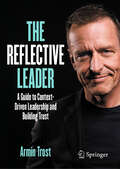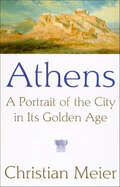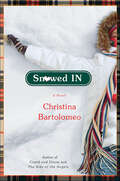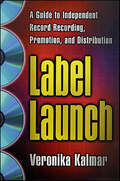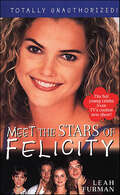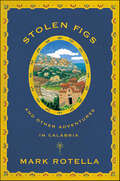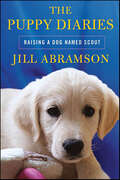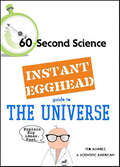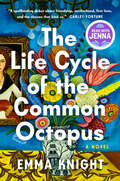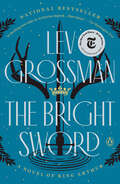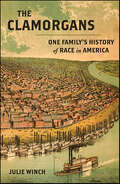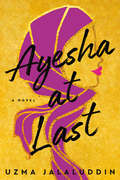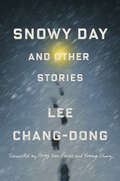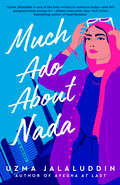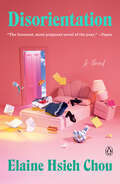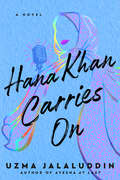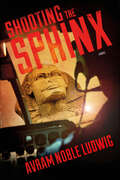- Table View
- List View
Media and Conflict: Critical Analysis of News Discourses in India
by Francis P. Barclay Kaifia Ancer Laskar Boobalakrishnan NatrayanThis book integrates critical studies of conflict news discourses and social media exchanges in India to discuss their underlying sociopolitical and economic ideologies and powerplays. Using several theoretical frameworks to investigate how assorted Indian conflicts are presented in the mediascape, the book aims to educate and empower audiences—and inspire the next generation of journalists to be constructively critical, ethical and peace-conscious.
Polygamous Marriages in Peninsular Malaysia: Family, Gender and Religion at the Crossroads
by Norani Othman Yaso Nadarajah Rozana Mohd IsaThis book presents the first national study of the practice of polygamy undertaken amongst Malay Muslims, contextualised within the broader social, legal, and political context of Malaysia. A collaboration between the Sisters in Islam NGO and three universities in Malaysia, it examines the perspectives of both men and women through quantitative and qualitative data analysis of over 1,200 surveys and more than 60 in-depth interviews charting the legal, financial, social, and emotional impacts of polygamy. It incorporates both progressive Islamic scholarly thought and the unique sociologically rich perspectives of the study respondents. In doing so, the data serves to strengthen advocacy for awareness and law reforms within Islamic jurisprudence frameworks and institutions. As one of the most comprehensive surveys ever conducted on polygamy in a Muslim society, this represents a major tour de force within a little explored field with tremendous potential for societal impact. This book is relevant to academics and graduate students seeking a deeper understanding of the issues related to Muslim polygamous marriage and to researchers within the broader fields of gender studies, family studies, Islamic studies, and Islamic legal studies. It is also a landmark resource for activists and policymakers seeking to advocate on behalf of marginalised groups—particularly women and children in polygamous families.
Climate Change: Intervention Strategies and Sustainable Development in the Global South
by Camille Huggins Debra D. Joseph Maud MthembuThis book highlights the challenges with respect to climate change in the Global South. It demonstrates what has been happening in varying countries in this geographic location and how sustainable adaptation interventions could be used to alleviate these challenges. Most countries in the Global South are extremely vulnerable and unprepared for the present and future impact of climate change. Some climate change events that are presently plaguing these locations are extreme weather events such as flooding, food insecurity, disasters and droughts. The book provides case studies and interventions that can be a source to others who are seeking to find solutions to these adverse climate change events.
Authentic Holistic Education, Wellbeing, and the Future of Catholic Schools in a Changing World: Owning the Incarnation (SpringerBriefs in Education)
by Graeme J. MellorThis book addresses the effects of the changed and changing contexts of Catholic Education in the contemporary world. These include the social, educational, and ecclesial contexts. Meaning structures, shaped by these past contexts, have broken down, and the greatest, but often unarticulated context is the anthropological context. The understanding of humanity and the meaning of human existence today is beset by a marked lack of clarity and consistent direction. Catholic Education today exists within contextual fields which are almost unrecognizable from those which existed at the close of the Second World War. Each succeeding decade since has wrought stark and dynamic change socially, educationally, and religiously. As such, Catholic Education today looks for a direction forward and a sense of purpose into the future. This book proposes that the major purpose of contemporary Catholic Education is to provide an educational context that nurtures the true holistic growth of students within its care. The focus upon Christian Humanism in contemporary Papal and Magisterial teaching sets the ground for this developing understanding.
Anterior Cruciate Ligament Injuries Throughout the Life Span
by Mustafa Karahan João Espregueira-Mendes Annunziato Amendola Sachin R. Tapasvi Can Doruk Basa Jonathan D. HughesThis book uniquely addresses anterior cruciate ligament (ACL) injury – one of the leading issues in orthopedic sports medicine – throughout the lifespan, with a focus on differences depending on age and activity levels.It provides readers with fundamental knowledge, such as anatomy histology and biomechanics, as well as with diagnostic criteria specific for each age group and activity level – from pediatrics through adolescents to adults and high-level athletes. Furthermore, international experts present diverse prevention and injury management criteria as well as state-of-the-art surgical techniques based on the expectations of each age and lifestyle group. Designed to be an easy-to-read reference guide, this book presents fundamental concepts in the management of ACL injuries. It appeals to a broad readership ranging from orthopedic surgeons, residents and sports physicians to athletic trainers and all professionals involved in rehabilitation following ACL injuries.
Pedagogical Anthropology of Technology: Practices, Objects and Ways of Life
by Johannes Bilstein Jörg Zirfas Matthias WinzenThe volume examines the question of which specifically educational techniques are required in view of the increasing establishment and professionalization of pedagogical fields of work. In this context, an attempt is made to clarify what pedagogical and didactic preparation must take place for an increasingly technically oriented world. In addition, the everyday techniques of self-care are analyzed. And finally, pedagogical anthropology is also concerned with the question of who is the subject and object of technology.
The Reflective Leader: A Guide to Context-Driven Leadership and Building Trust
by Armin TrostEffective leadership requires a clear idea of leadership, which must be primarily guided by the specific conditions of their leadership context. Only the leader themselves is responsible for developing the right idea of leadership. Leaders who actively reflect on their context and their role are more likely to achieve success. By combining thoughtful self-awareness with intentional decision-making, they can move beyond relying solely on intuition and gut feelings. This approach fosters stronger, trust-based relationships between leaders and employees. This book not only provides theoretical foundations but also offers practical tools that have been proven effective in practice over many years. With the help of this book, managers will learn to understand their leadership context and, based on that understanding, develop their idea of leadership. Additionally, it shows how they can communicate and act upon their leadership idea. Therefore, this book consciously avoids presenting a normative, ideal, and universally applicable approach. This is where it differs from many other works that promote a single leadership ideal. This book is aimed at leaders, emerging leaders, leadership trainers, leadership coaches, CEOs, and HR managers focused on leadership development and talent management.
Athens: A Portrait of the City in Its Golden Age
by Christian MeierA lively and accessible history of Athens's rise to greatness, from one of the foremost classical historians.The definitive account of Athens in the age of Pericles, Christian Meier's gripping study begins with the Greek triumph over Persia at the Battle of Salamis, one of the most significant military victories in history. Meier shows how that victory decisively established Athens's military dominance in the Mediterranean and made possible its rise to preeminence in almost every field of human eavor--commerce, science, philosophy, art, architecture, and literature. Within seventy-five years, Athens had become the most original and innovative civilization the ancient world ever produced.With elegant narrative style, Meier traces the birth of democracy and the flourishing of Greek culture in the fifth century B.C., as well as Athens' slow decline and defeat in the Peloponnesian War. The great figures--from politicians and generals like Themistocles and Alcibiades to the philosophers Socrates and Plato--emerge as flesh-and-blood human beings, firmly rooted in their times and places. This is history in the tradition of Simon Schama and Barbara Tuchman--learned, accessible, and beautifully written.
Snowed In: A Novel
by Christina BartolomeoNo job. No heat. The wrong shoes. The wrong clothes. Discover if true love can be far behind. Imagine having always lived in Washington, D.C., and suddenly being stuck in Portland, Maine, for a year. With the pipes freezing---inside the house. And a husband who seems to have his eye on a hiking-booted L.L.Bean femme fatale rather than you. Not to mention the mother-in-law from hell who never fails to let you know that you leave much to be desired. That's Sophie Quinn's life. Lucky for Sophie (an unassertive type who's always favored daydreams over day planners), her new life is about to throw in her lap some weird and valuable opportunities to trample down her fears and transform her prospects for happiness. And true love just might come knocking on her door....For any woman who has ever had to confront the landlord about the heat, for any woman who has ever longed for impractical shoes instead of sturdy winter boots, for any woman who has ever been in the wrong place at the right time, Snowed In will have you laughing, crying, and rooting for Sophie Quinn.
The Big White Book of Weddings: A How-to Guide for the Savvy, Stylish Bride
by David TuteraEntertaining expert David Tutera opens his files to reveal a wealth of detailed information about creating that perfect day, featuring advice about everything from wording invitations to negotiating with caterers, planning the meal to throwing an event on a budget.The same insight celebrity entertaining and wedding expert David Tutera gives to his A-list clientele is now at your fingertips in The Big White Book of Weddings: David's ultimate "how-to" guide designed to get every bride down the aisle in style!It's tough to be a bride on a budget—but David reveals his personal tips of the wedding trade that proves brides can be both sophisticatedly chic and realistically resourceful! Covering the entire wedding experience from brainstorming, budgeting, invitations, gift registries, food, music, traditional reception rituals, and even what happens after the wedding's over, Tutera has created a must-have for brides-to-be. Full of the personality that David brings to every wedding he plans and every TV show or magazine article he appears in, Big White Book of Weddings is the book every bride needs to make her wedding unforgettable for all the right reasons!Includes sections such as:- Create engaging menus and creative cocktails in "Eat, Drink and Be Married!"- Be Perfectly Polished with "Etiquette for the Elegant"- Make your entertainment a hit without needing a rock-star budget in "Strike up the Band"- Go from "Ordinary to Extraordinary" with decor and floral tips from the pro
Label Launch: A Guide to Independent Record Recording, Promotion, and Distribution
by Veronika KalmarWhether you're in a band, a business entrepreneur or just interested in the music business, Label Launch will let you take your fantasies of holding the reigns at your own record label into reality. In fun, easy-to-understand language Veronika Kalmar takes you step-by-step through the intricate process of running a label from the moment you think about entering the biz until your first CD, vinyl single, or demo tape rolls off the press. Topics covered include:Funding your labelManeuvering through the legal mazeSelling your product online and offPicking and signing bandsPromotion and touringAvoiding the most common pitfalls of a new labelAnd even tells you when it's time to sell out to "the man."Kalmer has culled information from the best in the independent record business interviewing heads of labels who have made a great success and those that almost didn't make it.
Felicity: Meet the Stars
by Leah FurmanThe fabulous foursome from TV's FelicityKeri Russell, stars as FelicityScott Speedman plays BenScott Foley portrays NoelAmy Jo Johnson plays JulieHow do these gifted actors feel about the characters they play? Are they similar to them in any way? What are their lives like on and off the set of TV's hottest show? Find out the real story of Felicity's hot young stars.
Stolen Figs: And Other Adventures in Calabria
by Mark RotellaAn effortlessly artful blend of travel book, memoir, and affectionate portrait of a peopleCalabria is the toe of the boot that is Italy—a rugged peninsula where grapevines and fig and olive trees cling to the mountainsides during the scorching summers while the sea crashes against the cliffs on both coasts. Calabria is also a seedbed of Italian American culture; in North America, more people of Italian heritage trace their roots to Calabria than to almost any other region in Italy.Mark Rotella's Stolen Figs is a marvelous evocation of Calabria and Calabrians, whose way of life is largely untouched by the commerce that has made Tuscany and Umbria into international tourist redoubts. A grandson of Calabrian immigrants, Rotella persuades his father to visit the region for the first time in thirty years; once there, he meets Giuseppe, a postcard photographer who becomes his guide to all things Calabrian. As they travel around the region, Giuseppe initiates Rotella—and the reader—into its secrets: how to make soppressata and 'nduja, where to find hidden chapels and grottoes, and, of course, how to steal a fig without actually committing a crime. Stolen Figs is a model travelogue—at once charming and wise, and full of the earthy and unpretentious sense of life that, now as ever, characterizes Calabria and its people.
Sister Parish Design: On Decorating
by Susan Bartlett Crater Libby CameronComfort is the essential element of a successful interior and the hallmark of the Parish-Hadley style. In Sister Parish Design, Libby Cameron, Sister's last protégé, and Susan B. Crater, Sister's granddaughter, explore this aspect and much more in a series of conversations with the leading decorators of today. Sister Parish is the iconic American decorator of her generation. Her use of flowered chintzes and overstuffed armchairs combined with unexpected items, like patchwork quilts and painted furniture, is credited with popularizing what is known as American Country–style during the 1960s. Her passion for bold color and mixed patterns invoked charm, imagination, and a lived-in look to her rooms. Her philosophy was to be unafraid and to put things together because you liked them--not because they matched. Filled with beautifully-rendered watercolor illustrations, Sister Parish Design is more than just a stunning book—it is an inspirational resource that all decorating aficionados will want to add to their bookshelf.
The Puppy Diaries: Raising a Dog Named Scout
by Jill AbramsonAn instructive and marvelously entertaining chronicle of a puppy's first year, by the executive editor of The New York Times One sparkling summer day, Jill Abramson brought home a nine-week-old golden retriever named Scout. Over the following year, as she and her husband raised their adorable new puppy, Abramson wrote a hugely popular column for The New York Times's website about the joys and challenges of training this rambunctious addition to their family. Dog-lovers from across the country inundated her with e-mails and letters, and the photos they sent in of their own dogs became the most visited photo album on the Times's site that year.Now Abramson has gone far beyond the material in her column and written a detailed and deeply personal account of Scout's first year. Part memoir, part manual, part investigative report, The Puppy Diaries continues Abramson's intrepid reporting on all things canine. Along the way, she weighs in on such issues as breeders or shelters, adoption or rescue, raw diet or vegan, pack-leader gurus like Cesar Millan or positive-reinforcement advocates like Karen Pryor.What should you expect when a new puppy enters your life? With utterly winning stories and a wealth of practical information, The Puppy Diaries provides an essential road map for navigating the first year of your dog's life.
Instant Egghead Guide: The Universe (Instant Egghead Guides)
by Scientific American Ted AlvarezEverything from quarks to galactic superclusters delivered to your eyeballs at the speed of light (any faster would be impossible)Take a tour of the wonder and majesty of the universe, from the smallest subatomic particles to the possibility of infinite universes. According to some prominent physicists, it's possible that, right now, someone who looks just like you is reading the back of a book just like this one in a parallel universe. And your double thinks it looks really interesting... Whether you're a fan of Scientific American's wildly popular 60-Second Science Podcast or just curious about science, you're going to want to dust off your Dad's telescope and warm up your particle accelerator after enjoying the bite-sized physics knowledge in The Instant Egghead Guide to the Universe.
The Life Cycle of the Common Octopus: A Novel
by Emma KnightAN INSTANT NEW YORK TIMES BESTSELLER | READ WITH JENNA BOOK CLUB PICK AS FEATURED ON TODAY&“Undeniably delicious.&” —The New York Times&“A spellbinding debut about friendship, motherhood, first love, and the choices that bind us. . . I couldn't put it down!&” —Carley Fortune, #1 New York Times bestselling author of This Summer Will Be DifferentA witty, atmospheric, and brilliantly told novel that offers compelling portraits of womanhood, motherhood and female friendship, along with the irresistible intrigue surrounding an extraordinary British familyArriving at the University of Edinburgh for her first term, Pen knows her divorced parents back in Canada are hiding something from her. She believes she&’ll find the answer here in Scotland, where an old friend of her father&’s—now a famous writer known as Lord Lennox—lives. When she is invited to spend the weekend at Lord Lennox&’s centuries-old estate with his enveloping, fascinating family, Pen begins to unravel her parents&’ secret, just as she&’s falling in love for the first time . . .As Pen experiences the sharp shock of adulthood, she comes to rely on herself for the first time in her life. A rich and rewarding novel of campus life, of sexual awakening, and ultimately, of the many ways women can become mothers in this world, The Life Cycle of the Common Octopus asks to what extent we need to look back in order to move forward.
The Bright Sword: A Novel of King Arthur
by Lev GrossmanNATIONAL BESTSELLER • A New York Times Editors&’ Choice • The #1 New York Times bestselling author of the Magicians Trilogy and &“master storyteller&” (New York Times) returns with a triumphant reimagining of the King Arthur legend for the new millennium Los Angeles Times Book Prize Finalist NAMED A BEST BOOK OF THE YEAR BY THE NEW YORK TIMES, NPR, THE WALL STREET JOURNAL, VANITY FAIR, TIME, OPRAH DAILY, TOWN & COUNTRY, ELLE, VOX, PASTE, LIT HUB, POLYGON, KIRKUS REVIEWS &“Lev Grossman&’s The Bright Sword stands out as the best fantasy of the year.&” —The Wall Street Journal &“Grossman, who is best known for his The Magicians series, is at the top of his game with The Bright Sword.&” —The New York Times Book Review &“A thrilling new take on Arthurian legend. . . . Marvelous.&” —The Washington Post &“If you love King Arthur as much as I do, you&’ll love Lev Grossman&’s The Bright Sword, a fresh and engrossing take on the Matter of Britain featuring a colorful cast of Round Table knights who don&’t often get as much story time as they deserve. The creator of The Magicians has woven another spell.&” —George R. R. Martin, #1 New York Times bestselling author of A Game of ThronesA gifted young knight named Collum arrives at Camelot to compete for a place at the Round Table, only to find that he&’s too late. King Arthur died two weeks ago at the Battle of Camlann, and only a handful of the knights of the Round Table are left.The survivors aren&’t the heroes of legend like Lancelot or Gawain. They&’re the oddballs of the Round Table, like Sir Palomides, the Saracen Knight, and Sir Dagonet, Arthur&’s fool, who was knighted as a joke. They&’re joined by Nimue, who was Merlin&’s apprentice until she turned on him and buried him under a hill. But it's up to them to rebuild Camelot in a world that has lost its balance, even as God abandons Britain and the fairies and old gods return, led by Morgan le Fay. They must reclaim Excalibur and make this ruined world whole again—but first they'll have to solve the mystery of why the lonely, brilliant King Arthur fell. The first major Arthurian epic of the new millennium, The Bright Sword is steeped in tradition, complete with duels and quests, battles and tournaments, magic swords and Fisher Kings. It's also a story about imperfect men and women, full of strength and pain, trying to reforge a broken land in spite of being broken themselves.
The Clamorgans: One Family's History of Race in America
by Julie WinchThe Damning, Absurd, and Revelatory History of Race in America Told through the History of a Single FamilyHistorian Julie Winch uses her sweeping, multigenerational history of the unforgettable Clamorgans to chronicle how one family navigated race in America from the 1780s through the 1950s. What she discovers overturns decades of received academic wisdom. Far from an impermeable wall fixed by whites, race opened up a moral gray zone that enterprising blacks manipulated to whatever advantage they could obtain. The Clamorgan clan traces to the family patriarch Jacques Clamorgan, a French adventurer of questionable ethics who bought up, or at least claimed to have bought up, huge tracts of land around St. Louis. On his death, he bequeathed his holdings to his mixed-race, illegitimate heirs, setting off nearly two centuries of litigation. The result is a window on a remarkable family that by the early twentieth century variously claimed to be black, Creole, French, Spanish, Brazilian, Jewish, and white. The Clamorgans is a remarkable counterpoint to the central claim of whiteness studies, namely that race as a social construct was manipulated by whites to justify discrimination. Winch finds in the Clamorgans generations upon generations of men and women who studiously negotiated the very fluid notion of race to further their own interests. Winch's remarkable achievement is to capture in the vivid lives of this unforgettable family the degree to which race was open to manipulation by Americans on both sides of the racial divide.
Ayesha at Last: A Novel
by Uzma JalaluddinAs seen on The Today Show! One of the best summer romance picks!One of Publishers Weekly Best Romance Books of 2019!A modern-day Muslim Pride and Prejudice for a new generation of love.Ayesha Shamsi has a lot going on. Her dreams of being a poet have been set aside for a teaching job so she can pay off her debts to her wealthy uncle. She lives with her boisterous Muslim family and is always being reminded that her flighty younger cousin, Hafsa, is close to rejecting her one hundredth marriage proposal. Though Ayesha is lonely, she doesn't want an arranged marriage. Then she meets Khalid, who is just as smart and handsome as he is conservative and judgmental. She is irritatingly attracted to someone who looks down on her choices and who dresses like he belongs in the seventh century.When a surprise engagement is announced between Khalid and Hafsa, Ayesha is torn between how she feels about the straightforward Khalid and the unsettling new gossip she hears about his family. Looking into the rumors, she finds she has to deal with not only what she discovers about Khalid, but also the truth she realizes about herself.
Snowy Day and Other Stories
by Lee Chang-dong&“Vivid . . . These stories, in which class divisions form impassable rifts and submission to the status quo comes at great psychic cost, have much to say about our contemporary reality." —The New York Times Book Review&“What a gift to have these stories translated, finally, into English!&” —Ari Aster, director of Midsommar and HereditaryThe first story collection published in English by Lee Chang-dong, one of South Korea&’s most celebrated and influential literary and cinematic figuresMuch like Lee Chang-dong&’s internationally renowned films (Burning, Secret Sunshine, and Poetry), these brilliant, unsettling tales, originally published in Korea in the 1980s and now translated into English for the first time, investigate themes of injustice, betrayal, and terror—on both an intimate and national scale. Lee writes deeply and hauntingly about conflicts between family, the powerful and the vulnerable, conformists and rebels.In the title story, drawn from the author&’s own memories of serving in the South Korean military, the class divide between a university-educated private and a working-class corporal serving sentry duty together one snowy night leads to tragic consequences. In &“There&’s a Lot of Shit in Nokcheon,&” the psychological violence that two brothers enact on each other over the course of a lifetime captures the darkness and paranoia that pervaded Korea in the 1980s, as the country struggled toward democratic rule. And in the novella-length &“A Lamp in the Sky,&” a young woman&’s brutal interrogation at the hands of the police reveals the series of increasingly troubling decisions that led her to this moment. Is she innocent or guilty? In the end, even she cannot say.Snowy Day and Other Stories introduces English readers to a master storyteller.
Much Ado About Nada
by Uzma JalaluddinA sparkling second-chance romance inspired by Jane Austen&’s Persuasion... Nada Syed is stuck. On the cusp of thirty, she&’s still living at home with her brothers and parents in the Golden Crescent neighbourhood of Toronto, resolutely ignoring her mother&’s unsubtle pleas to get married already. While Nada has a good job as an engineer, it&’s a far cry from realizing her start-up dreams for her tech baby, Ask Apa, the app that launched with a whimper instead of a bang because of a double-crossing business partner. Nothing in her life has turned out the way it was supposed to, and Nada feels like a failure. Something needs to change, but the past is holding on too tightly to let her move forward. Nada&’s best friend Haleema is determined to pry her from her shell…and what better place than at the giant annual Muslim conference held downtown, where Nada can finally meet Haleema&’s fiancé, Zayn. And did Haleema mention Zayn&’s brother Baz will be there? What Haleema doesn&’t know is that Nada and Baz have a past—some of it good, some of it bad and all of it secret. At the conference, that past all comes hurtling at Nada, bringing new complications and a moment of reckoning. Can Nada truly say goodbye to once was or should she hold tight to her dreams and find their new beginnings?
Disorientation: A Novel
by Elaine Hsieh ChouA NEW YORK TIMES EDITORS&’ CHOICE SELECTION * A MALALA BOOK CLUB PICK * AN INDIE NEXT PICK * A FAVORITE BOOK OF 2022 BY NPR AND BOOK RIOT * A MUST-READ MARCH 2022 BOOK BY TIME, VANITY FAIR, EW AND THE CHICAGO REVIEW OF BOOKS * A MOST ANTICIPATED BOOK OF 2022 BY GOODREADS, NYLON, BUZZFEED AND MOREA Taiwanese American woman&’s coming-of-consciousness ignites eye-opening revelations and chaos on a college campus in this outrageously hilarious and startlingly tender debut novel.Twenty-nine-year-old PhD student Ingrid Yang is desperate to finish her dissertation on the late canonical poet Xiao-Wen Chou and never read about &“Chinese-y&” things again. But after years of grueling research, all she has to show for her efforts are a junk food addiction and stomach pain. When she accidentally stumbles upon a curious note in the Chou archives one afternoon, it looks like her ticket out of academic hell. But Ingrid&’s in much deeper than she thinks. Her clumsy exploits to unravel the note&’s message lead to an explosive discovery, upending her entire life and the lives of those around her. What follows is a roller coaster of mishaps and misadventures, from book burnings and OTC drug hallucinations, to hot-button protests and Yellow Peril 2.0 propaganda. As the events Ingrid instigated keep spiraling, she&’ll have to confront her sticky relationship to white men and white institutions—and, most of all, herself. A blistering send-up of privilege and power, and a profound reckoning of individual complicity and unspoken rage, in Disorientation Elaine Hsieh Chou asks who gets to tell our stories—and how the story changes when we finally tell it ourselves.
Hana Khan Carries On
by Uzma JalaluddinOne of Amazon's Best Romances of the Month!For fans of "You&’ve Got Mail," a young woman juggles pursuing her dream job in radio while helping her family compete with the new halal restaurant across the street, in this sparkling new rom-com by the author of Ayesha at Last. Sales are slow at Three Sisters Biryani Poutine, the only halal restaurant in the close-knit Golden Crescent neighborhood of Toronto. Hana waitresses there part time, but what she really wants is to tell stories on the radio. If she can just outshine her fellow intern at the city radio station, she may have a chance at landing a job. In the meantime, Hana pours her thoughts and dreams into a podcast, where she forms a lively relationship with one of her listeners. But soon she'll need all the support she can get: a new competing restaurant, a more upscale halal place, is about to open in the Golden Crescent, threatening her mother&’s restaurant. When her mysterious aunt and her teenage cousin arrive from India for a surprise visit, they draw Hana into a long-buried family secret. A hate-motivated attack on their neighborhood complicates the situation further, as does Hana's growing attraction for Aydin, the young owner of the rival restaurant--who might not be a complete stranger after all. As life on the Golden Crescent unravels, Hana must learn to use her voice, draw on the strength of her community and decide what her future should be.
Shooting the Sphinx: A Novel
by Avram Noble LudwigShooting the Sphinx: a unique political thriller about an American filmmaker who becomes involved in the Egyptian Revolution of 2011 by Avram Noble Ludwig.In Hollywood, Ari Basher is the stuff of legends, the man who always gets the impossible-to-film shots. In Cairo, however, he faces the most difficult and dangerous challenge of his career: he must photograph, from mere feet away, the face of the imperishable Sphinx. The film depends on it, but if Ari damages the ancient Sphinx, he could end up in an Egyptian prison for life or even dead. Compounding his troubles, Ari has saved a dark-haired revolutionary named Farah from being raped by government thugs, and she has turned his life around. Now he is caught in a web of intrigue, torn between his need to work with the military dictatorship to get the shot and his desire for this passionate revolutionary. Losing her is not an option.Will Ari join in the liberation of Egypt? Will he and Farah escape the country alive? Finally . . . will Ari get the shot?At the Publisher's request, this title is being sold without Digital Rights Management Software (DRM) applied.
